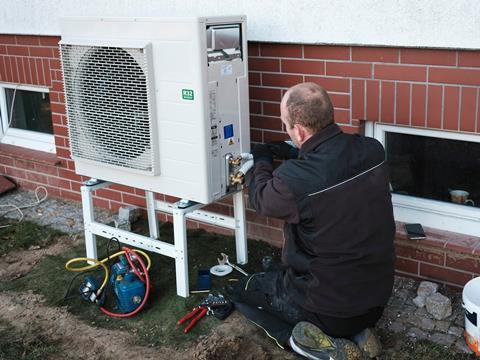Prices of low carbon devices have fallen just 6% since 2021 despite target for 25% reduction by next year
The government is relying on “optimistic assumptions” about consumer demand for heat pumps in order to meet its home decarbonisation targets, the National Audit Office (NAO) has warned.
Ministers have pledged to ensure 600,000 of the low-carbon heating devices are installed in UK homes by 2028 but last year saw just 55,000 installations, according to Heat Pump Association data.
In order to meet its target, the government would need to see an elevenfold increase in the number of installations between 2022 and 2028, the NAO said in a new report published this morning.

Meanwhile, the government is aiming for the cost of installing a heat pump to fall by at least 25% to 50% by next year compared to 2021 prices. As of last year, costs had only fallen by 6% in real terms.
Installation costs will need to fall around three times faster over the next three years to reach the 25% cost reduction target, according to the NAO.
The independent regulator said it had been told by the Department for Energy Security and Net Zero, which oversees the government’s home decarbonisation programmes, that price reductions had been slowed by global supply chain pressures including a shortage of semiconductors and high energy prices.
Demand for heat pumps among individual households remains low compared to government targets, partly because of the cost of installing and running the devices.
As of December 2023, the average market rate for replacing a gas boiler was still around four times higher than replacing like-for-like. Electricity also remains more expensive per unit than gas, making heat pumps potentially more expensive to run than a gas boiler.
The government has committed to rebalance energy prices over the course of the 2020s, including shifting energy levies and obligations from electricity to gas bills but these plans have been delayed by nearly two years, partly due to a focus on reducing overall energy bills following price hikes caused by Russia’s invasion of Ukraine.
Nick Winser, commissioner at the National Infrastructure Commission (NIC), said the report highlighted that the government’s plans to meet its target to install 600,000 heat pumps a year by 2028 “appear insufficient”.
“Recent decisions to delay or reverse policy have only made hitting these targets harder,” Winser said, adding: “The NAO’s call for government to develop a more robust, holistic, longer term plan is absolutely right.”
The report also highlighted how ongoing uncertainty over the role which hydrogen could play in decarbonising the UK’s 28 million homes was potentially subduing demand for heat pumps.
The government has said it expects heat pumps and heat networks will be the primary technologies for decarbonising residential heating over the next decade, but has not ruled out using hydrogen despite the NIC recommending that the gas should not play a role.
A decision on hydrogen has been pushed back to 2026 to allow ministers to gather more evidence on the technology but much of this work has either been delayed or cancelled, according to the NAO.
A neighbourhood trial planned for 2023 has been pushed back to this year, while a village trial originally planned for 2025 has been cancelled.




























No comments yet